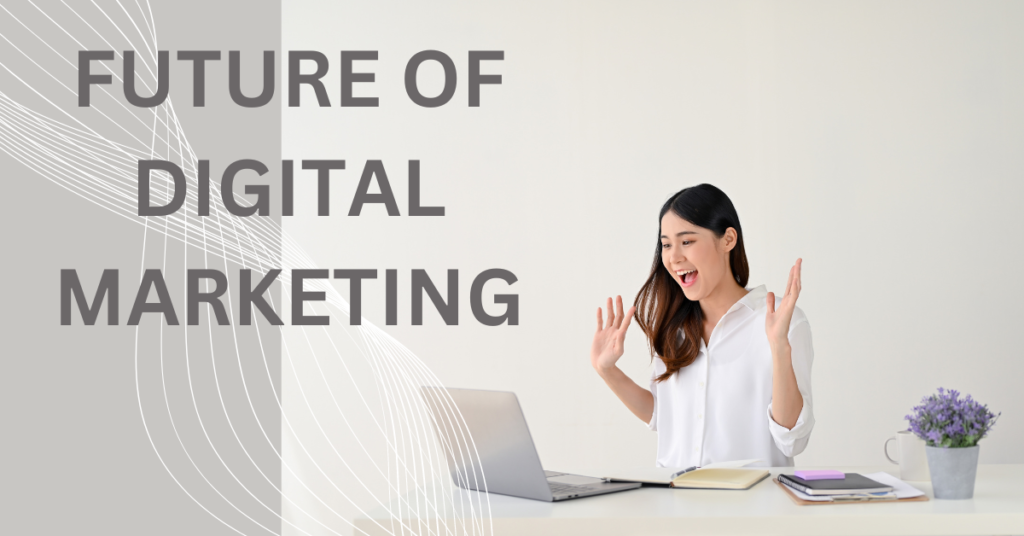
The future of digital marketing is bright because there is more market and consumer awareness. Businesses can also use a wide range of smart tools. To collect an ocean of data and make in-depth analyses of their target audience. It’s a completely new way to approach the audience.
The world is on the internet! From social media to Google searches, we all use the internet throughout the day. With this change in lifestyle, new platforms for marketing emerged. While traditional marketing still has its place in the world,. Digital marketing is quickly taking over, thanks to affordability and analytics. A huge number of people are engaging via the internet, and digital marketing is growing. Only going to increase further in the future.
Artificial Intelligence: Future of digital marketing
The role of artificial intelligence is already playing a significant part. In digital marketing by helping in the in-depth analysis of large volumes of datasets, identifying focus areas, and more. Artificial intelligence has helped in profound ways for marketers to learn from these precious insights. The future of digital marketing is an amalgamation of artificial intelligence-led solutions and data science. That would enable brands to make the most of the content-aware ecosystem.
They are used across several operations for voice and face recognition and digital assistants. Especially by brands like Netflix and Amazon. As a self-sufficient ecosystem in itself, marketers need to transform their approach and sincerely analyze customer behavior. AI also helps in understanding the viable environment for higher, personalized shopping experiences.
As artificial intelligence and marketing come closer. There would be no specific job titles for brands. They can call individuals trained in both marketing intelligence and intelligence management or something similar. The scope of their tasks would increase with particular tech skills. And can come with a cross-level specialization and be adept in multiple technologies and automation platforms.
Hyper-personalization
Hyper-personalization in digital marketing refers to the use of advanced data analytics, artificial intelligence, and machine learning. To deliver highly tailored and relevant experiences to individual users. Unlike traditional personalization, which might involve segmenting users into broad categories,. Hyper-personalization aims to create unique experiences for each person based on their specific behaviors, preferences, and interactions. Here’s a closer look at what hyper-personalization involves and its implications:
Benefits of Hyper-Personalization
1. Enhanced User Engagement: Personalized experiences lead to higher engagement rates as users feel more valued and understood.
2. Increased Conversion Rates: Tailored recommendations and offers often result in higher conversion rates and sales.
3. Improved Customer Loyalty: When users receive relevant content and offers, they are more likely to develop brand loyalty.
4. Better Customer Insights: Detailed data on individual preferences and behaviors helps brands understand their audience better.
Voice search and conversational AI
The digital marketing landscape has experienced tremendous growth and change over the past few years. One of the most significant shifts has been the increasing. importance of artificial intelligence (AI) and voice search in shaping the way businesses promote their products and services. These emerging technologies have the potential to completely transform digital marketing strategies. making them more efficient, personalized, and customer-centric. In this article, we will explore how AI and voice search are poised to become the future of digital marketing.
Voice search refers to the use of voice commands to perform searches and interact with digital devices. This technology is primarily facilitated by virtual assistants. like Amazon’s Alexa, Google Assistant, Apple’s Siri, and Microsoft’s Cortana.
Conversational AI is a field of artificial intelligence. That focuses on creating systems that can interact with humans in natural, meaningful ways through spoken or written language. It encompasses technologies such as chatbots, voice assistants, and interactive virtual agents that simulate human-like conversations
Augmented Reality (AR) and Virtual Reality (VR)
Augmented reality (AR) and virtual reality (VR) are transformative technologies. that offer immersive experiences and practical applications across various fields. AR overlays digital information onto the real world, enhancing users’ interactions. With their environment through devices like smartphones and AR glasses. This technology is widely used in retail for virtual try-ons. In education for interactive learning and in navigation for enhanced directions. VR, on the other hand, immerses users in a completely virtual environment, providing a 360-degree simulated experience through VR headsets. This technology excels in gaming, training simulations, healthcare applications, and real estate by offering interactive and realistic scenarios. Both AR and VR are revolutionizing industries by enhancing user engagement. Providing new learning methods and creating innovative ways to interact with digital content. As these technologies advance, they promise even greater integration and impact in everyday life, driving new opportunities and experiences.
In the end, the future of digital marketing will be characterized by a blend of advanced technology. Personalized experiences, and a strong emphasis on ethical practices. Staying adaptable and forward-thinking will be key for marketers to thrive in this evolving landscape.
